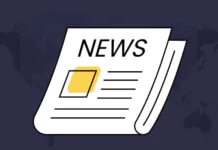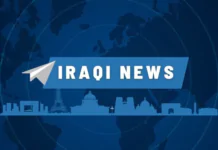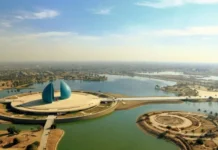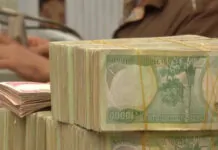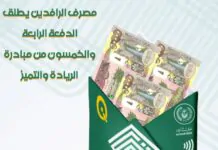Economist: Lowering Interest Rates Encourages Investment But Carries Caveats
Time: 2024/10/27 Read: 1,131 times {Economic: Al Furat News} Economic expert Salah Nouri confirmed today, Sunday, that reducing the interest rate is one of the main tools of monetary policy used by the Central Bank to influence the economy, whether by increasing or decreasing it according to inflation or deflation rates.
Nouri explained in his interview with {Euphrates News} that “reducing the interest rate encourages individuals and companies to borrow for productive projects, which leads to stimulating the economy,” adding: “Lower interest makes the cost of loans lower, and thus encourages consumption and investment.”
Nouri pointed out that “reducing the interest rate reduces the cost of production and perhaps the prices of imported goods, which leads to a reduction in selling prices,” but he warned that “reducing the interest rate may push depositors to withdraw their deposits due to the decrease in returns, and resort to alternative investments such as gold.”
He added: “It is necessary for the Central Bank to monitor the money market and commodity prices to measure the level of inflation, especially since facilitating borrowing may affect the elasticity of demand versus supply.” From.. Raghad LINK
“Hybrid Monetary Policy”.. Al-Sudani’s Advisor Reveals The Central Bank’s New Step
Time: 2024/10/26 Read: 5,187 times “Hybrid Monetary Policy”.. {Economic: Al Furat News} The economic advisor to the Prime Minister, Mazhar Muhammad Salih, explained today, Saturday, precise details about the importance and reasons for the Central Bank of Iraq’s decision to reduce interest.
Useful summary.. In important news you can find it on Al Furat News channel on Telegram.. To subscribe click here
Saleh told {Euphrates News} that: “It is clear that the monetary policy of the Central Bank of Iraq has become a policy that meets the requirements of growth in real economic activity, through activating its operational objectives aimed at reducing the cost of credit and financing within the joints of the economic system in general and the banking system in particular.
” He explained, “The Central Bank began, through its decision issued in accordance with its circular on October 24, to reduce the monetary policy interest rate (which is the rate at which the Central Bank of Iraq deals with the banking system) by about 200 percentage points,
by lowering the interest at which the Central Bank deals with banks from 7.5% to 5.5%, which means that the Central Bank of Iraq has become following an expansionary policy in targeting the money supply in a manner that is consistent with activating the real sector in the national economy and confronting unemployment indicators in the overall economy.”
According to the statement of the Prime Minister’s economic advisor, “Despite the above, the bank in its new policy did not neglect the importance of continuing to control local liquidity levels and carrying out high sterilization operations, by offering debt instruments called Islamic certificates of deposit with a return that increases with the length of the amortization period of those securities purchased by the banking system, which are considered sovereign debts that can be mortgaged or discounted in the secondary market and are excellent debts.”
He continued, “The monetary policy of the Central Bank has given a signal to the financial and banking system that its easy or flexible policy adopted by the bank in moving the liquidity of the economy is under continuous control in order to play the role of the monetary authority in combating inflationary activities and imposing economic stability as its first central goal.”
Saleh concluded by saying, “Between expanding the movement of economic liquidity as an expansionary policy and imposing control over liquidity levels by offering debt instruments in return at the same time in parallel, we can call the current monetary policy of the Central Bank of Iraq a {hybrid flexible monetary policy}.”
The bank decided to reduce the interest rate from 7.5% to 5.5%, in addition to reactivating the securities (Islamic certificate of deposit and money transfers) according to an annual plan and with two terms: with a return of 4% for a period of 14 days and a return of 5.5% for a period of 182 days. LINK Raghad
MP: America Is Waging An Economic War Against Iraq
Today 11:48 Information/ Baghdad.. Today, Sunday, the representative of the Sadiqoun parliamentary bloc, Rafiq Hashem, accused America of practicing economic warfare against Iraq, stressing that the trend towards Russia and China is the only salvation from American hegemony.
Al-Salihi told Al-Maalouma Agency, “America is waging an economic war against Iraq in order to keep its forces in the country, indicating that America is preventing Iraq from obtaining its money from oil sales.”
He added, “America is plotting a new economic conspiracy against the Iraqi people by reducing financial transfers to Iraq, which has led to an increase in the dollar exchange rate against the Iraqi dinar.”
He pointed out that “Iraq’s openness to major countries such as Russia and China is the only solution to get rid of American economic hegemony.” LINK
237 Thousand Barrels Per Day, Iraq’s Oil Exports To America
Energy Economy News – Baghdad The US Energy Information Administration announced on Sunday that Iraq’s oil exports to the US increased during the past week.
The administration said in a table that “the average US imports of crude oil during the past week from 10 major countries amounted to 5.647 million barrels per day, up by 640 thousand barrels per day from the previous week, which amounted to 5.007 million barrels per day.”
She added that “Iraq’s oil exports to America amounted to 237 thousand barrels per day last week, an increase of 167 thousand barrels per day from the previous week, which amounted to 70 thousand barrels per day.”
The administration indicated that “the largest oil revenues for America during the past week came from Canada at a rate of 3.719 million barrels per day, followed by Colombia at an average of 365 thousand barrels per day, followed by Venezuela at an average of 289 thousand barrels per day, and from Brazil at an average of 285 thousand barrels per day.”
According to the table, “the amount of US imports of crude oil from Mexico was 258 thousand barrels per day, from Saudi Arabia it was 150 thousand barrels per day, from Ecuador it was 138 thousand barrels per day, from Nigeria it was 125 thousand barrels per day, and from Libya it was 89 thousand barrels per day.” https://economy-news.net/content.php?id=49193
For The First Time Since June 2023.. The Central Bank Of Iraq Reduces The Interest Rate
Time: 2024/10/26 Read: 2,210 times {Economic: Al Furat News} The Central Bank of Iraq decided to reduce the interest rate and reactivate the use of securities in the country’s banks, for the first time since June 2023.
Useful summary.. In important news you can find it on Al Furat News channel on Telegram.. To subscribe click here
According to a document issued on Thursday by the Central Bank of Iraq and addressed to banks operating in Iraq, the bank decided to reduce the interest rate from 7.5% to 5.5%, in addition to reactivating the securities (Islamic certificate of deposit and money transfers) according to an annual plan and with two terms: with a return of 4% for a period of 14 days and a return of 5.5% for a period of 182 days.
The maximum investment ceiling was set at no more than 50% of the total private sector deposits in the bank, and the bank’s investment ceiling in a single auction should not exceed (500) billion Iraqi dinars.
This decision comes within the framework of the Central Bank’s preparations to end direct monitoring of financial transfers at banks, after launching an electronic platform in early 2023, which aims to enhance proactive monitoring of financial transfers.
According to an informed source in the bank, in a previous press statement, dealing in dollar transfers was limited to only six banks, while 13 banks will trade in other currencies, while the banks subject to US Federal Reserve sanctions remain under review by international auditing companies. LINK
“Sovereignty” reminds Al-Sudani’s government of what remains of the political agreement paper: 5 points that have not been achieved
27-October-2024 The Sovereignty Alliance, headed by Khamis Al-Khanjar, called on the government of Mohammed Shia Al-Sudani to implement the remainder of the political agreement paper signed by the parties of the State Administration Alliance, including approving the general amnesty law and turning the page on displacement.
According to a statement issued by the coalition and seen by “Ultra Iraq”, it called on the government of Mohammed Shia al-Sudani to “implement what remains of the political agreement paper signed by the parties of the state coalition, the most important of which is turning the page on displacement and returning residents to their original cities and regions; and transferring the accountability and justice file to the management of the judicial institution away from any political and personal pressures and calculations.”
The statement added: “As well as approving an amendment to the general amnesty law, as well as compensating the owners of homes destroyed and damaged by terrorism,” in addition to “achieving balance within the institutions of the Iraqi state.” LINK
Combating Money Laundering.. Why Doesn’t Iraq Establish A Financial Intelligence Unit? – Urgent
Economy |Baghdad Today – Baghdad Professor of International Economics, Nawar Al-Saadi, revealed today, Sunday (October 27, 2024), that there are failures in the file of combating money laundering inside Iraq, wondering about the reasons for not establishing a financial intelligence unit.
Al-Saadi said in an interview with Baghdad Today, “Despite the presence of the Anti-Money Laundering and Terrorist Financing Office within the structure of the Central Bank of Iraq since 2007, this office suffers from a lack of resources and the absence of full support and coordination with other agencies, which limits its ability to combat money laundering effectively, especially in light of the challenges related to currency smuggling and the exploitation of security companies as outlets for illicit financing.”
He explained that “establishing an independent financial intelligence unit could play a decisive role in unifying the efforts of multiple institutions to track financial crimes related to currency smuggling and terrorist financing, and achieving integration between intelligence analysis operations and financial information.
This unit will enhance Iraq’s ability to cooperate internationally, especially with international organizations, which support the exchange of information between financial intelligence units globally, and enhance oversight of the banking system and combat money smuggling and terrorist financing practices through security companies and other channels.”
He added, “From a security perspective, leaving the tasks of monitoring financial mafias within the jurisdiction of general military commands specialised in combating terrorism and criminal crime is a major challenge.
Financial crimes require a different methodology that includes financial analysis and investigation of transfers and properties, while criminal and terrorist crimes focus on methods and tactics related to immediate arrest and deterrence of violent activities.”
“From an economic and financial perspective, financial crimes and terrorist crimes are fundamentally different; the former seek to camouflage and convert illicit funds into legitimate funds using legitimate economic channels, while terrorist crimes focus on achieving political goals through intimidation.
Separating these two types of crimes will enable Iraq to build an effective oversight system that is appropriate to the nature of each type of crime and will help protect the Iraqi economy from the challenges associated with money laundering and terrorist financing,” he added.
The professor of international economics concluded by saying that “with better integration between institutions and independent financial intelligence units, Iraq will have a greater ability to reduce financial crimes, increase transparency and enhance its position within the international economic system, which is essential to advance the local economy and restore confidence in the domestic financial system.”
On January 9, 2022, the Ministry of Foreign Affairs announced the removal of Iraq from the European Union’s list of high-risk countries in the field of combating money laundering and terrorist financing, according to a letter received by the former Prime Minister from the European Commission mission.
In May 2020, the European Commission classified Iraq, along with other countries, including Afghanistan, Pakistan, Syria, Yemen, Iran and North Korea, as countries that pose financial risks to the European Union, due to shortcomings in combating money laundering and terrorist financing.
On February 18, 2020, the Terrorist Funds Freezing Committee of the Cabinet Secretariat issued a list of 84 individuals and entities whose funds were frozen on charges of financing terrorism, at the request of the UN Security Council. LINK

